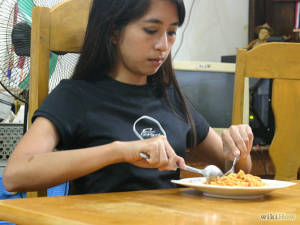
By Rabbi Ari Enkin, rabbinic director, United with Israel
Table manners are an essential component of Torah-true Judaism. Indeed, the Talmud is replete with references and instructions on how, when, where and, of course, what we are supposed to eat.
The ancient Persians are said to have had exemplary table manners worth emulating. So essential are proper table manners to being a good Jew that the Yom Kippur confessional includes a beat on the chest for misbehavior in this area. Let’s take a closer look.
Dining times are delineated by the Talmud according to class and personality. Members of each class are advised as to when they should first sit down to eat every day. Look out for your category: If you happen to be a cannibal, then it is recommended that you partake of your meal within the first hour of every morning. If you’re a thief, better you should eat during the second hour. If you’re rich, it is recommended that you dine in the third hour of the day. If you’re just a simple, ordinary Jew, you should be eating during the fourth hour. If your occupation is one that requires you to work with your hands, then you should try eating in the fifth hour. Finally, if you are an aspiring Torah scholar, you should eat your meal in the sixth hour of the day. Regardless of when you do decide to eat, it should be at a set time every day.
Meals are supposed to be held with family and other loved ones rather than alone. As the wise King Solomon stated: “Better is a meager meal of vegetables with love than a rich, luxurious meal without love.”

(Wikihow.com)
Eating in public, however, is considered to be in poor taste. Furthermore, we must not eat until we are stuffed, but rather, just enough so that we are no longer hungry. Indeed, overeating is a grave sin. One is also obligated to say words of Torah at least once during the course of a meal. We are taught that drinking hot liquids and eating warm bread Saturday nights has secret healing powers. One should eat only when hungry and drink only when thirsty.
It is strongly advised to begin the day with an early breakfast, and eating well should protect one from bad weather. We should wait after eating before beginning any exercise. Our eating should exceed the amount we drink, and one should never drink out of the same cup as someone else. We should also not drastically change our diet, as it can lead to severe intestinal disorders. It goes without saying that wasting food is a serious sin.
Eating should never be a rushed event – take your sweet time. The Talmud recommends that we not slice bagels or meat upon our hands, as the blood that gushes from such a wound may spoil or otherwise ruin the taste of our food. Additionally, a guest should never serve food to the children of the host, lest there be a lack of food for the guests. Never stare at a person who is eating. It is prohibited to invite people for a meal if it is known in advance they will not be able to attend.
It is a well-known teaching that our tables are compared to the altar of the Holy Temple, so the next time you sit down to a meal, just think of all the mitzvot (Torah commandments) that you can do!
Do You Love Israel? Make a Donation - Show Your Support!
Donate to vital charities that help protect Israeli citizens and inspire millions around the world to support Israel too!
Now more than ever, Israel needs your help to fight and win the war -- including on the battlefield of public opinion.
Antisemitism, anti-Israel bias and boycotts are out of control. Israel's enemies are inciting terror and violence against innocent Israelis and Jews around the world. Help us fight back!



